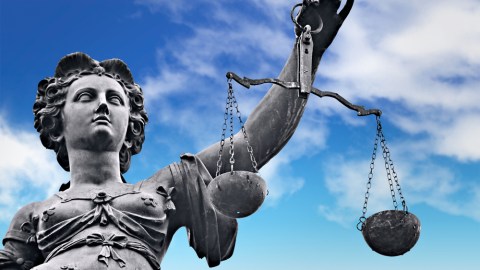Truth and Justice Eluded Former Tyco Execs Kozlowski and Swartz

Over the past two decades, our addiction to cell phones ended our need for public pay phones. As a result, there are no more telephone booths. For those of us who grew up watching “The Adventures of Superman,” we saw mild-mannered reporter Clark Kent slip into dozens of phone booths where he transformed into Superman. Over and over again, the caped superhero exited the booths to fight for truth, justice, and the American way. We were conditioned to believe that truth and justice for all was our birthright. I believed it. I thought the foundation of the American legal system was our collective desire for justice. But we have strayed from the American way that Superman embodied. Phone booths have disappeared, and so has our fight for truth and justice.
This month, the State of New York will parole former Tyco International CEO Dennis Kozlowski and former CFO Mark Swartz after they each served 100 months, that’s 8 1/3 years, in prison. The two former executives were convicted of a number of felony charges related to unauthorized compensation they received during the decade they led the huge multinational conglomerate. There are those who believe their sentences were too light, and that the justice system isn’t tough enough on white –collar crime. But looking at the facts of this case, and the circumstances under which Kozlowski and Swartz were prosecuted, it’s entirely possible they shouldn’t have been charged, convicted, or incarcerated. In this case, truth and justice were lost in the process.
It seems all politicians, prosecutors, judges, and others who are seeking office or courting public favor claim to be tough on crime. It is perhaps the only political position for which there is universal support. How many stump speeches have asked for tougher laws, more severe criminal penalties, and depending on the time and place, taken aim at specific individuals? For example, in the early 2000s, it was opportunistic to target executives of large corporations. With daily headlines filled with the details of massive corporate scandals, it was advantageous to go after those at the top of the some of the largest corporations in the world. There were accolades and rewards for those who identified, investigated, prosecuted, and convicted corporate executives. This was especially true in New York City.
Recognizing corporate corruption and ending abuses of power are noble goals. No one argues that we, as a society, should be weak on white-collar crime. We all want corporations and their leaders to act ethically, responsibility, and to make decisions that are in the best interest of their constituents. But our system of overseeing, controlling, and when necessary, punishing corporations and their executives is flawed. Convictions should not be the goal; justice should be the goal. Instead of rewarding those who prove themselves to be the toughest on white-collar crime, why don’t we reward those who demand justice? Why aren’t there incentives for those who seek the truth? Unfortunately, not all politicians, lawmakers, and prosecutors seek justice. It is far more advantageous to get convictions, to prosecute, win, and throw people in prison for as long as possible. Truth and justice are often lost in the process because there are no incentives for achieving just outcomes. The only rewards are for convictions — for winning.
In their aggressive pursuit of white-collar criminals and the rewards that come with convicting high profile business leaders, some prosecutors have resorted to over criminalizing the decisions and actions of corporate executives. Some bad business decisions are crimes, but most are not. It’s possible to act unethically, foolishly, and even harmfully without breaking any criminal laws. Bad business decisions are not necessarily crimes. Unethical business actions are not necessarily crimes. Prosecutors have a lot of discretion and if they choose, they may charge business men and women with crimes for unethical, foolish, sloppy business decisions that would be more appropriately addressed with disciplinary action or resolved through civil litigation. In many cases, the criminal allegations are enough to end careers, cause irreparable harm, bankrupt, and forever change the lives of those accused — whether or not they are ever convicted.
Mens rea is a basic tenet of criminal law. Translated from Latin, mens rea refers to a person’s state of mind. In order for an individual to be convicted of a crime, with few exceptions, the prosecution must prove beyond a reasonable doubt that the accused acted with some degree of criminal intent. In other words, to be guilty of a crime, an individual must have known that what he or she was doing was wrong. In white-collar prosecutions, criminal intent is often the most difficult hurdle to clear. How do you prove that a corporate executive acted with criminal intent when he or she may have simply made bad business decisions, without the intent to do anything wrong? If an individual sells illegal drugs or robs a bank, it’s pretty easy to show that he or she knew what they were doing was wrong. But when making decisions as a corporate executive, it is more difficult to show that an individual knew that his or her decisions and actions were criminal — that they knowingly did something wrong.
In the 2005 trial of Kozlowski and Swartz, the Manhattan District Attorney had to prove beyond a reasonable doubt that the former Tyco executives took compensation from the company, more than $170 million, that the two men knew they had no right to receive. There was a lot of evidence showing that Kozlowski and Swartz received the money openly — the transactions in question were processed in the ordinary course of business, the payments were reported by Kozlowski and Swartz to the company’s auditor, PricewaterhouseCoopers, the two declined offers of substantial additional compensation offered to them by the Tyco board of directors, and the defendants never actually took much of the money in question out of the company. The actions of the defendants showed clearly that they believed they had a right to the money. However, the DA didn’t see it that way, and zealously prosecuted the two former executives. For months, prosecutors shared with the jury voluminous evidence of the defendants’ lavish lifestyles; during the trial being wealthy was equated to being evil, to being criminal. Prosecutors also fought during the trial and throughout the appellate process to keep critical evidence from Kozlowski and Swartz — evidence that even the appellate court admitted could exonerate the defendants. In the end, the defendants were not allowed to have that evidence, the jury never saw it, and the former Tyco executives were found guilty of a long list of felonies that sent Kozlowski and Swartz to New York State prisons for 8 1/3 to 25 years.
For the Manhattan DA, the convictions were very important. It was immediately after the bankruptcies of corporate powerhouses Enron, WorldCom, and Global Crossing (Tyco never declared bankruptcy and continued to thrive after the scandal), the public was disgusted with highly-paid corporate executives, and Kozlowski and Swartz were among the most richly compensated business leaders in the world. The Manhattan DA would be rewarded for convicting them — Robert Morgenthau, then the DA, was re-elected shortly after Kozlowski and Swartz were sentenced in the fall of 2005.
The public wanted convictions — not justice. Prosecutors focused on winning more than finding the truth and fighting for justice. Is this now the American way? Win at all costs — without regard for truth and justice?
I spent two and a half years researching the Tyco corporate scandal and immersed in the criminal prosecution of Kozlowski and Swartz. Before I began this project, I was naïve. I believed everyone involved in our legal system wanted the same thing: to find the truth. I thought everyone wanted to provide all existing evidence to those accused of crimes, especially evidence that could prove they were innocent. No one would knowingly allow them to be convicted without affording them the opportunity to present all relevant evidence to the jury that would decide their fates. I was wrong. The trial of Kozlowski and Swartz wasn’t about justice. It was about winning. It was about convicting wealthy corporate executives at a time when those convictions were politically advantageous.
In our legal system, truth and justice have become as scarce as telephone booths.
© 2014 Catherine S. Neal, author of Taking Down the Lion: The Triumphant Rise and Tragic Fall of Tyco’s Dennis Kozlowski
Author Bio
Catherine S. Neal, author of Taking Down the Lion: The Triumphant Rise and Tragic Fall of Tyco’s Dennis Kozlowski, is an Associate Professor of Business Ethics and Business Law in the Haile/US Bank College of Business at Northern Kentucky University. She is a graduate of the University of Cincinnati College of Law where she was a Corporate Law Fellow. Professor Neal was granted unprecedented access to Dennis Kozlowski, his papers, attorneys, family, friends, and former Tyco colleagues, as well as transcripts and evidence from two criminal trials. Neal‘s research included interviews with former Manhattan DA Robert Mortgenthau, the foreman of the jury that convicted Kozlowski, and key Tyco insiders.
For more information please visit http://us.macmillan.com/takingdownthelion/CatherineNeal





